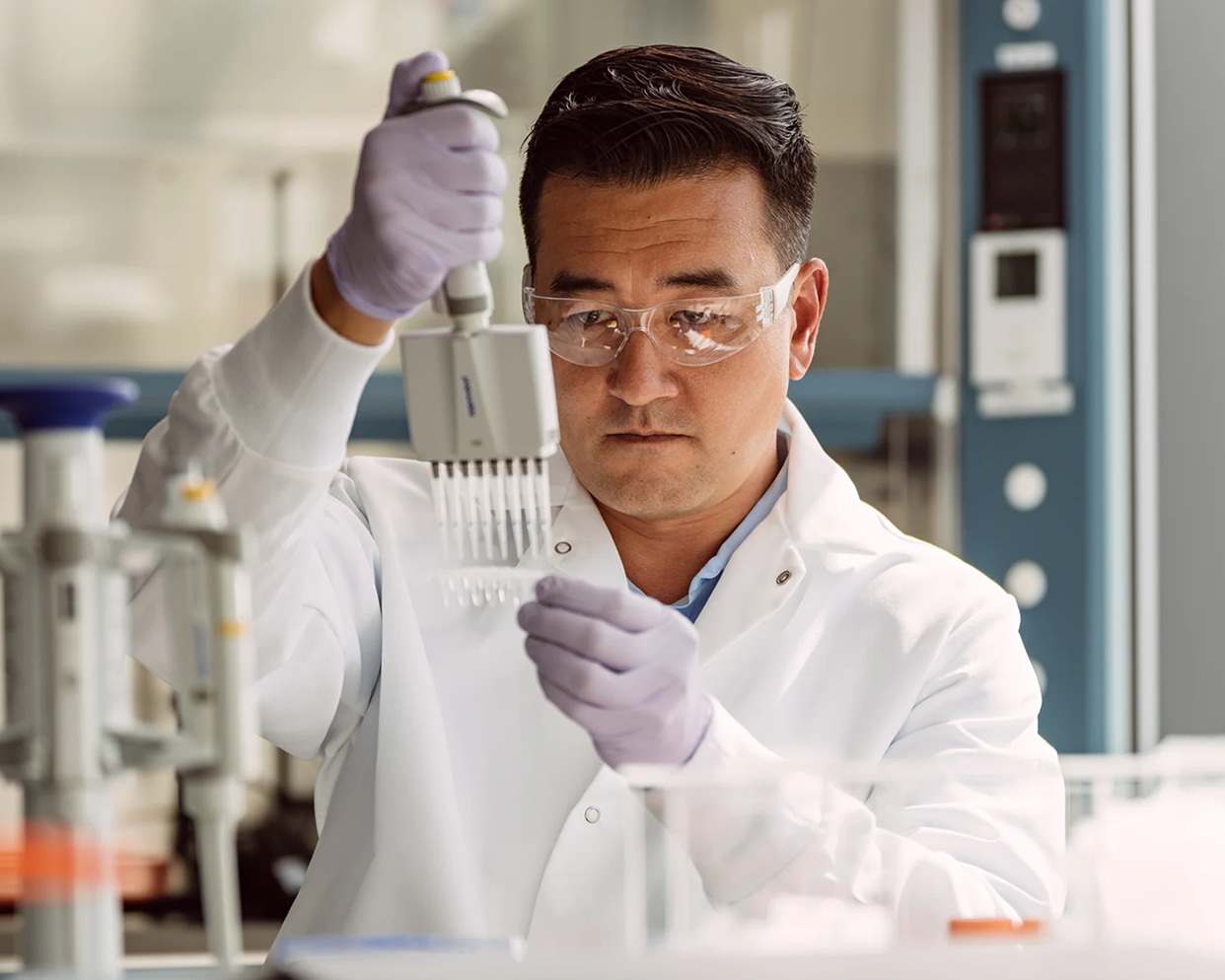
Infinium Global Diversity Array-8 Kit
BeadChip combining exceptional coverage of clinical research variants with optimized multiethnic, genome-wide content for genotype screening.
Identify genetic variants linked to complex diseases

Genome-wide association studies (GWAS) are research approaches that scan and compare the genomes of many individuals in an effort to identify genetic variants associated with specific traits or diseases. Using high-throughput genomic technologies, GWAS analyzes the DNA of individuals in large populations to uncover variants such as single nucleotide polymorphisms (SNPs) and copy number variations (CNVs) that may influence disease risk. These studies are essential for understanding the genetic architecture of complex diseases and guide research into the development of targeted therapies used in precision medicine.1,2
Complex diseases are often linked to common genetic variants, while the role of rare or low-frequency variants is still not well understood. Large-scale GWAS using microarrays are an efficient and cost-effective way to find loci and impute common SNP variants associated with disease. However, microarrays have limits when it comes to detecting low-frequency SNP variants. Whole-genome sequencing, with its base-by-base resolution, can identify both common and rare variants that may be linked to disease.
Learn more about:
GWAS for many diseases and disorders have not yet been performed and the large majority of participants in GWAS to date are of European ancestry. As the European population accounts for just ~16% of the global population, there is a recognized need for more diverse GWAS data sets.5,6
In addition to ethnic diversity, there is a need to perform GWAS on diverse diseases within specific sub-groups. This will help provide clues about which genes and gene pathways could be involved in disease mechanisms and pathogenesis.
GWAS with the commonly used case-control setup approach, which compares two large groups of individuals—one case group affected by a disease and one healthy control group—have successfully identified variants for specific complex diseases, such as:
Genome-wide association studies have identified thousands of variants with putative roles in different diseases. However, going from statistical associations to true insight into disease mechanisms remains a challenge. Advances in sequencing technologies have facilitated the development of strategies for assaying GWAS SNPs for potential functional relevance.
Explore how GWAS is offering powerful genomic insights to shape our understanding of drug development studies, complex diseases, cancer risk, and more.
Read how researchers used a multiomics approach to amplify GWAS in finding targets for drug development.
Read this article to explore the last twenty years of GWAS-related work that has reshaped our understanding of complex diseases such as diabetes, arthritis, cancer, and dementia.
Learn how researchers leveraged the UK Biobank and arcOGEN resources to perform a genome-wide meta-analysis for osteoarthritis across ~17.5 million single nucleotide variants in 455,221 individuals to identify 65 genome-wide significant variants.
Read how scientists performed pan-cancer and cross-population GWAS meta-analysis to identify novel cancer risk loci and highlight shared heritability between breast and prostate cancer.
Variant to function (V2F) research focuses on mapping genetic variants to disease in order to discover new biomarkers, understand how these variants affect cellular processes, and make breakthroughs that will change how we treat complex diseases. Watch this video to learn more about V2F research.
Researchers performed large GWAS studies to identify disease-associated DNA risk loci and develop polygenic risk scores.
Professors at Children's Hospital of Philadelphia discuss how they used NGS to map variants to causal genes.
Read how GWAS was used, along with imaging, multiomic technologies, and big data, to uncover novel diagnostic and therapeutic targets for common chronic diseases.
This example of a GWAS workflow highlights the use of the Infinium Global Screening Array-24, a powerful and cost-effective BeadChip for population-scale genetic studies, variant screening, and precision medicine research. It covers an extensive range of diseases, enabling validation of disease associations, risk profiling, preemptive screening research, and pharmacogenomics studies.
Infinium Global Screening Array-24 Kit
A scalable, cost-effective solution for population genetics, pharmacogenomics studies, and precision medicine research.
DesignStudio Custom Assay Design Tool
A free, user-friendly assay design tool for creating custom microarray probes and sequencing panels optimized for specific genomic content of interest.
The iScan System delivers high-quality data for a broad range of genomic applications with the flexibility to meet various throughput needs.
These automation option packages are equipped with robot control software for Infinium assays, enabling streamlined sample preparation workflows and reduced errors.
A highly customizable laboratory information management system to track samples and manage workflows efficiently and securely.
This powerful solution supports the genotyping analysis of microarray data with performance-optimized tools and a user-friendly graphical interface to convert data into meaningful results quickly and easily.
A flexible software solution to reduce array data size and facilitate analysis of large array experiments with automated sample statistics and allele calling.
Using GWAS for trait mapping in crops
This webinar discusses eRD-GWAS, or "expression read depth genome-wide association study," a genome-wide approach for identifying genes whose expression patterns affect phenotypic traits.
Using AI and automation to boost array analysis efficiency
In this webinar, learn how to use AI and automation to improve cytogenic array analysis in clinical research workflows.
Using GenomeStudio Software to create custom cluster files
Watch this webinar to learn how to cluster the SNPs in your custom array through proper filtering and editing of files.
Learn how to obtain a high-resolution view of the entire genome with whole-genome sequencing.
Analyze genetic variation on any scale, for a broad range of applications using microarrays.
See how to efficiently detect single nucleotide polymorphisms and variants using microarrays and sequencing.
Learn about solutions to identify copy number variations using microarrays or sequencing.

Find resources designed to educate on the basics of next-generation sequencing.
Explore the latest genomics discoveries and data analysis innovations by Illumina scientists.
Find everything you need to get started with genomics, from training to experiment planning, purchasing, and more.
Speak to a specialist to get answers on how to get started with GWAS.
Your email address is never shared with third parties.